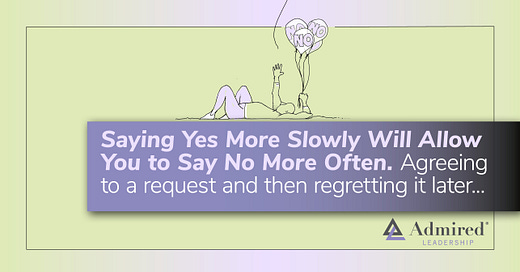Agreeing to a request and then regretting it later is a universal experience.
Leaders want to be helpful and liked by others, just like everyone else. But in their ambition to gain acceptance and please others, they sometimes say “Yes” to a request when they should have said “No.”
With so much to do and so little time to do it, leaders need to get better at declining more requests and invitations so they can focus their time on what really matters.
One way leaders can become more selective and say “No” more often is to say “Yes” more slowly. Asking clarifying questions upon receiving a request can help leaders make better choices, ones they will be less likely to regret later on.
Questions that clarify the request and slow down the decision might include:
Who else have you asked?
What is involved?
Why are you asking me?
How important is this to you?
What is the consequence if I can’t do it?
Why am I the best person to do this?
How much preparation is required?
If I can only do a part of this, which part is most important to you?
Who will be in attendance?
What expectations will others have?
Be wary of those who can’t answer these questions. It likely reflects that the request is not that important or you are being asked because you are an easy target. Strongly consider saying “No” to any request that lacks thoughtful answers to clarifying questions.
Slowing down the decision process before agreeing buys the time to consider all of the angles and consequences. There is always an opportunity cost. Whatever a leader says “Yes” to narrows the possibility of lending a hand with other invitations.
Knowing time is the only asset that doesn’t grow or appreciate, good leaders are stingy with what they agree to. Focusing on the highest and best use of time is what productive people do. Saying “Yes” more slowly will help to clarify whether agreement is a good or a bad call. A polite “I must say decline” is often the best choice. Learn to make the best choice more often by slowing down.





I’ve been there. Saying yes when I should’ve said no. For two reasons: time and/or I truly didn’t want to do it. Some of my almost no’s turned into I’m glad I said yes.
I agree that saying “yes” more slowly is wise, and I love the list of probing questions. Nonetheless, I have found that a bigger problem is people in leadership positions who are too quick to say “no” or, worse still, “maybe,” which is the coward’s “no.”
True leaders always start with a “yes” in their heart, have a good reason for “no,” and avoid “maybe” altogether. It’s just a matter of respect for their people.